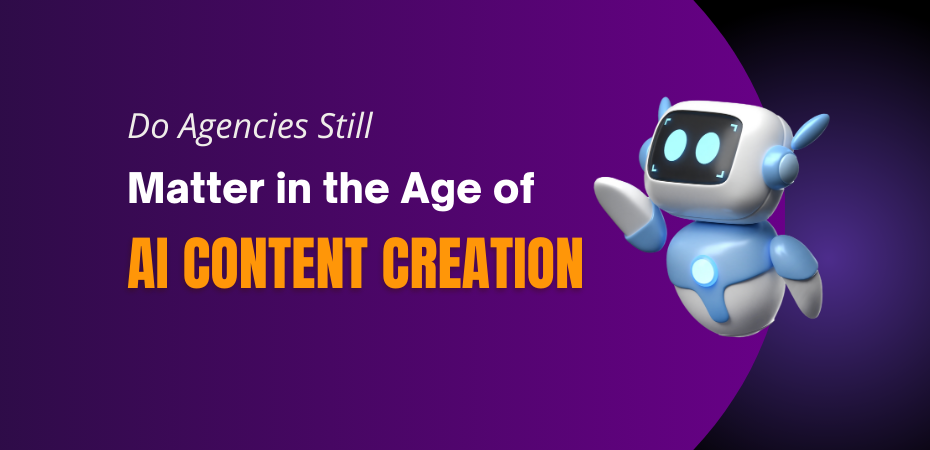Do Agencies Still Matter in the Age of AI Content Creation?



Artificial intelligence generated content is taking the marketing world by storm. With tools like ChatGPT, Jasper, and Copy.ai, producing articles, ad copy, and social posts has never been faster or easier. This new wave of AI content creation has brought incredible convenience to agencies looking to scale, save time, and deliver content at lightning speed.
But here’s the catch: while AI generated content can mimic tone and follow structure, it still lacks the strategic nuance, emotional intelligence, and authentic brand voice that real human creatives bring to the table.
As a leading white label SEO provider, we at White Label SEO Providers work closely with agencies globally. We’ve seen first-hand that relying solely on AI for content creation can compromise brand identity and strategic impact. In this blog, we explore the value of keeping the human layer intact in content marketing, especially for agencies delivering high-value work to their clients.
The Rise of AI in Content Creation: Tools, Trends & Capabilities
The explosion of generated artificial intelligence tools has transformed the digital marketing space. Platforms like ChatGPT, Jasper, and Writesonic can now generate blogs, product descriptions, email newsletters, and social captions in seconds. This level of ai content generation brings clear advantages.
What makes AI attractive for content work:
- Speed: AI can produce thousands of words in minutes
- Scale: Output can easily increase to meet client demands
- Structure: Algorithms follow SEO guidelines and grammatical rules
- Cost-efficiency: Reduces time spent on drafts and revisions
However, artificial intelligence generated content often lacks key elements that make content perform:
- Personalization and empathy
- Deep industry knowledge
- Cultural context and lived experience
- Strategic alignment with broader marketing goals
While it’s a powerful support tool, AI lacks the “why” behind the content. It can’t ask hard questions, challenge assumptions, or innovate around storytelling in the way human teams do.
For agencies building long-term value and trust with clients, relying exclusively on AI generated models means losing the strategic sharpness and emotional resonance that creative work requires.
Brand Voice: What It Really Means (and Why It’s More Than Words)
Every successful brand has a recognizable tone, rhythm, and personality that sets it apart. This is what we call brand voice—the consistent expression of a brand’s values, mission, and audience connection.
Why brand voice matters:
- Builds emotional trust and loyalty
- Makes messaging distinct and memorable
- Drives consistency across platforms
- Aligns communication with core values
Let’s look at real-world examples. Think about Nike’s empowering and bold tone, or Mailchimp’s quirky yet helpful writing. These aren’t random styles—they’re intentional voice strategies that connect with audiences on a deeper level.
Now ask: can AI creative tools replicate this consistency and authenticity?
While AI tools can imitate writing styles, they often default to generic phrasing. They can’t grasp a client’s positioning nuances, nor can they capture the subtle shifts needed when writing for different customer personas or platforms.
At White Label SEO Providers, we help agencies refine and document their clients’ brand voices—ensuring all content, whether generated or human-crafted, stays true to the brand’s essence.
Where AI Falls Short: The Missing “Human Experience”
Google’s EEAT framework—Experience, Expertise, Authoritativeness, and Trustworthiness—sets the gold standard for content quality. It’s also why creative content written solely by AI often doesn’t rank as well or convert as strongly.
Let’s break it down:
AI limitations through the EEAT lens:
- Experience: AI has never lived the moments it writes about. It can’t share genuine insights or real case studies.
- Expertise: AI lacks contextual understanding or industry-specific depth.
- Authoritativeness: AI cannot develop a credible voice over time—it recycles publicly available data.
- Trustworthiness: AI content can be factually off, misleading, or entirely fabricated.
This becomes especially problematic when AI is used to write high-stakes content such as legal, medical, or financial topics. Even in lifestyle or eCommerce, tone misses and surface-level narratives can break trust.
The truth is: clients today don’t just want volume—they want value. AI may provide structure, but it doesn’t understand cultural moments, shifting consumer sentiment, or human pain points. That’s where strategic human input becomes non-negotiable.
The Strategic Power of Agencies: More Than Just Content
Agencies don’t just write—they think. That’s what separates an average campaign from one that drives results. As a white label partner, we see how the best agencies go beyond AI content generation and bring full-spectrum strategic thinking to the table.
Here’s what agencies deliver that AI can’t:
What makes agency strategy indispensable:
- Deep Discovery: Agencies conduct brand audits, stakeholder interviews, competitor research, and customer journey mapping.
- Channel Integration: They ensure consistent messaging across blogs, ads, UX copy, and social media.
- SEO Strategy Alignment: Great content works in tandem with keyword mapping, funnel positioning, and technical SEO.
- Creative Direction: Agencies ideate big ideas, campaign hooks, and content pillars that reflect real-world insight.
- Editorial Oversight: Human editors ensure the tone, rhythm, and brand personality remain intact.
By contrast, generated artificial intelligence tools can suggest blog topics but can’t assess whether those topics support larger business goals or seasonal campaigns.
That’s why at White Label SEO Providers, we believe AI is a tool—not a replacement. When agencies use AI for drafts and ideas, and humans for strategy and refinement, the results are powerful. And scalable.
AI + Agency = The Future of Smart Content Creation
The debate around AI vs. humans in content creation is outdated. The real magic happens when both work together. At White Label SEO Providers, we see the most successful agencies not fearing AI—but harnessing it as part of their workflows while maintaining their strategic edge.
Why the AI-human combo works best:
- AI speeds up research and ideation
- Humans ensure message clarity, authenticity, and emotion
- Agencies align content to real-world campaigns and branding
This hybrid approach allows agencies to increase volume without compromising quality. For instance, a blog draft created by an AI content creator’s platform can be improved by editors who apply storytelling, brand tone, and SEO best practices.
Tools like an AI brand voice generator can simulate tone, but only human strategists know how to shape that tone to reflect a client’s actual culture, mission, and customer expectations. That difference is critical in building a powerful brand voice and tone that resonates consistently.
Agencies can use AI content generation for marketing tasks like topic clustering, meta tag suggestions, and internal linking—while experts handle deeper responsibilities like positioning and messaging. It’s a complementary model, not a competitive one.
How to Choose the Right Agency in the AI Era
As AI becomes more integrated into content pipelines, not all content generation companies are created equal. Choosing the right agency partner—one who can balance automation with creativity—is more important than ever for long-term success.
What agencies should look for in a white label partner:
- Human expertise first: Teams with strong editorial, strategic, and brand storytelling backgrounds
- AI-aware, not AI-dependent: Agencies that use AI to support—not replace—real thinking
- Transparent processes: Including clear workflows, content review cycles, and strategic checkpoints
- Proven experience in SEO + branding: Ability to align content with both traffic and brand goals
- Commitment to EEAT: Content should reflect lived experience, trust, and authority
There’s a growing trend of creatives upset about AI, and understandably so—many feel the craft of storytelling is being diluted. However, agencies that prioritize human insight can reassure clients and protect creative standards.
Conclusion
As content creation AI continues to evolve, it’s tempting for agencies to lean heavily into its promise of speed and scale. But let’s be clear—tools don’t build trust. People do.
Yes, AI can draft. It can structure. It can even mimic a tone to a degree. But it doesn’t know your client’s audience. It doesn’t live their brand. And it certainly doesn’t understand the subtleties that turn a piece of content from passable to powerful.
That’s why agencies remain essential. From refining voice to protecting brand equity, from strategic content planning to campaign alignment, you do what AI can’t.
At White Label SEO Providers, we help agencies like yours bring strategy, quality, and storytelling back to the center of digital marketing. Together, we use AI where it helps—and lead with human insight where it matters most.
If your agency is navigating this AI-content landscape, let’s connect. It’s time to rethink artificial intelligence content marketing as a tool—not a solution—and return focus to what truly drives results: relevance, resonance, and real human connection.
Frequently Asked Questions (FAQs)
Not entirely. While AI can assist with drafting and ideation, it lacks emotional intelligence, cultural nuance, and brand context. Agencies still need human copywriters to craft meaningful, strategic, and on-brand messaging.
AI-generated content can be helpful when used properly, but it needs human oversight to ensure accuracy, originality, and SEO compliance.
Tools like an AI brand voice generator can replicate tone styles, but they can’t fully grasp the evolving nature of a brand’s personality. Consistent voice requires human strategic input and contextual understanding.